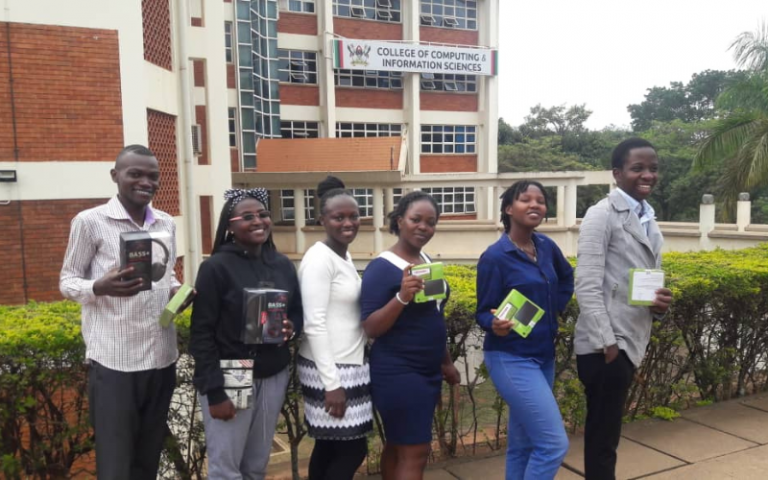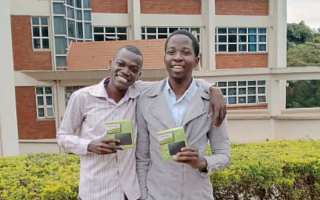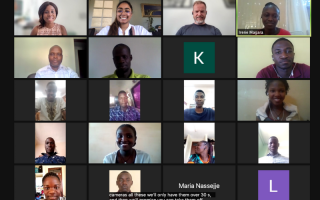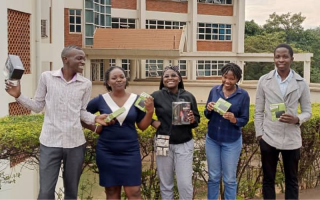Bringing together university students in Uganda and the UK to address society’s challenges
UCL PhD student Shirah Z Mansaray and lecturer Dr Michael Woodrow received funding from the Africa and Middle East Teaching Fund to run a universities challenge for students in Uganda and the UK.

5 October 2022
University students in the Global South tend to have few opportunities to collaborate with students in other locations. This is partly due to a lack of training with technology such as video conferencing software, as well as a lack of programmes and initiatives to connect them.
The Covid-19 pandemic highlighted some of these differences between university students in the Global North and the Global South. While university students in the Global North transitioned to online learning quite easily, students in the Global South found it more difficult. This was because of a lack of laptops and computing equipment, intermittent internet access and less proficiency with online learning software. As a result, university students in the Global North were able to collaborate and develop their digital proficiency, while students in the Global South were less able to do so.
In response to this, Shirah Z Mansaray – a PhD student at UCL STEaPP and Chief Executive of the charity I am Somebody’s Child Soldier – developed a universities challenge during the summer of 2022. The challenge involved more than 70 students from three universities in Uganda (Makerere University, Mbarara University, and Kyambogo University) and UCL.
Empowering students in Uganda
“We did a mapping exercise to understand the impact of Covid-19 on the education of university students in Uganda,” explained Shirah. “The results showed overwhelmingly that transitioning to remote learning was really difficult. One area of concern was students’ ability to use tools such as Zoom and Microsoft Teams. But instead of just running training sessions on how to use these tools, we wanted to make this programme really interactive and grounded in the students’ own passions and knowledge about local challenges.”
As a result, Shirah developed an online universities challenge, for which more than 200 students applied to take part. The final group was selected to ensure a mix of genders and engineering or technology specialties. These students were divided into smaller groups to explore one of four themes affecting women: food security, economics, electricity or education. Within each group, students were tasked with articulating what the problem was, what their proposed solution was, and what the case would be for funding, policy development or rollout on a wider scale.
To help them work together in small teams based in different locations, tutorials were run to train them in different aspects of technologies they could use. This included how to record presentations in Zoom and using Zoom breakout rooms, using interactive elements of Microsoft PowerPoint, using Miro and Jamboard (online whiteboard tools), and tips on how to ensure online presentations look professional. As the entire challenge was completed within a two week period, students were also taught Agile project management methodologies.
“It was intentional for us to have a time condensed programme, because we wanted to get students going quickly,” said Shirah. “This was both in terms of exploring the challenge, but also adapting and seeing how resilient they could be in the midst of this new way of working.” As students gained confidence and skills, they started coming up with their own ways to use technology to work together, including setting up WhatsApp groups. “We wanted them to use technology as much as possible due to the spread out nature of the groups. It ensured everyone could participate equally and no one was left out.”
Long-lasting impact
To complete the challenge, each group recorded a ten minute presentation. These presentations were sent to a judging panel of individuals based in Uganda, as well as UCL academics. The judges were selected for their expertise in gender education, engineering and online learning, which ensured students gained exposure to feedback based on a range of perspectives and areas of expertise. The winning presentation was an integrated spatial and visual model to help improve the mathematics performance of girls in Uganda. As well as choosing an overall winner, the judges also chose a best presenter and a best facilitator, to reward some students who really stood out in terms of their contribution. In addition, Shirah and the charity I am Somebody’s Child Soldier are planning to create some podcasts based on the final presentations.
Feedback from the students showed that they developed their confidence in online learning tools, and that they were able to develop their teamwork, leadership and creativity skills too. Not only is this beneficial for their university education, but also for the future employability of these students.
“I am really passionate about bringing change and justice to communities that have faced injustices,” said Shirah. “And when I look at education, I see that as an injustice, because of the fact some students are able to access education, whereas others aren't. Education has a huge role to play in helping communities come out of poverty and access their human rights.”
Shirah and I am Somebody’s Child Soldier are currently looking for funding opportunities to run a universities challenge again in 2023. This time, they would like to expand on the programme by teaching students some practical skills in relation to 3D printing and engineered interventions using Arduino Kits, to prepare students for applying for prizes such as the Africa Prize for Engineering Innovation.
“When it comes to students at university level in Uganda, they've managed to navigate many barriers to achieve schooling and get to university. It's commendable for them to be at university,” explained Shirah. “But the challenge is then about how they maximise learning opportunities at university in this digital age. I think this is about utilising online learning and technological innovation, and tapping into globalisation and global citizenship. That’s what this challenge is all about.”
Links
For the latest news about UCL’s international activity, partnerships and opportunities, subscribe to our bimonthly Global Update newsletter.
 Close
Close




